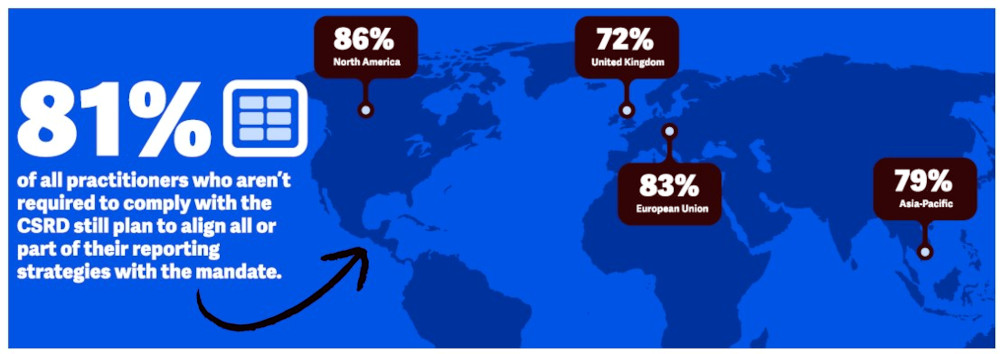The recently released third iteration of an annual ESG reporting survey showed
that, while it remains a contentious topic in some circles, most companies are
planning for a future of widespread and more transparent reporting.
Workiva’s 2024 ESG Practitioner
Survey — which compiled the
thoughts of more than 2,000 professionals working in ESG reporting at the
manager level or above — found that at a very basic level, 81 percent of
companies surveyed not subject to the EU’s Corporate Sustainability Reporting
Directive
(CSRD) were planning to comply with it anyway. What’s more, 92 percent of
companies are investing more in reporting to meet these and other upcoming
guidelines, including those in the US.
“It’s telling how global regulations are becoming the norm,” Mandi
McReynolds, Workiva’s chief
sustainability officer and VP of global ESG, told Sustainable Brands®
(SB).
The survey was done in March, so it doesn’t necessarily take into account the
recent SEC’s rollout of its climate-disclosure
rules
and the almost-immediate, associated legal
challenges.
Neither McReynolds nor Ascend2 CEO Todd
Lebo, whose company carried out the
research, says that that development would have necessarily affected the results
because the surveyed companies were already doing some level of reporting.
Where the challenges begin to arise is in the actual reporting process and the
confidence these professionals have in getting the data right. While 98 percent
of respondents think their ESG data is accurate, 83 percent say collecting
accurate data to meet the CSRD requirements is going to be a challenge for their
organization.
 Image credit: Workiva
Image credit: Workiva
Near the top of the list of those challenges are complying with these
ever-changing mandates and aligning with stakeholder needs. There are also
issues with the sheer volume of requirements: Some organizations are set up to
manage it all; others are not.
In this edition of the survey, Lebo told SB they made sure they involved people
inside and outside ESG/sustainability functions but had a qualifying question to
ensure respondents were involved in reporting in some capacity.
“It gave us a more holistic view,” he said.
This range of the corporate ladder highlighted differences in reporting
perception between executives and non-executives. 62 percent of executives
thought that their company applied “the same diligence” to ESG reporting as they
did financial reporting; however, that number dropped to 32 percent for
manager-level employees. The numbers were generally similar when discussing
perception of a company’s
materiality-assessment
and report-drafting processes. Between executives and those lower in
organizations, the perception gap is clear.
Overall, the report showed that companies are moving ahead in reporting —
whether to meet CSRD or generally to meet consumer expectations. However, the
constant change in reporting requirements is causing corporate grief as they try
to evolve to meet the standards of the moment and the “stakeholder demands for
transparency moving forward,” McReynolds said.
With Workiva being an ESG-reporting platform, it’s important to take the
company’s inherent lean towards a pro-reporting approach into account while
reviewing the report; but what’s clear is that across this survey group, more
investment in efficient reporting is on the horizon. 89 percent of companies are
planning to allocate more budget for “ESG initiatives” over the next three
years, with technology and
data
being a big part of that.
Increased investment will be required to meet upcoming requirements for
everything from materiality to emissions disclosures, regardless of a company’s
private or public standing.
As McReynolds asserted: “Better reporting will drive better business
performance, and increase the chances of meeting long-term ESG goals.”
Get the latest insights, trends, and innovations to help position yourself at the forefront of sustainable business leadership—delivered straight to your inbox.
Geoff is a freelance journalist and copywriter focused on making the world a better place through compelling copy. He covers everything from apparel to travel while helping brands worldwide craft their messaging. In addition to Sustainable Brands, he's currently a contributor at Penta, AskMen.com, Field Mag and many others. You can check out more of his work at geoffnudelman.com.
Published May 7, 2024 8am EDT / 5am PDT / 1pm BST / 2pm CEST